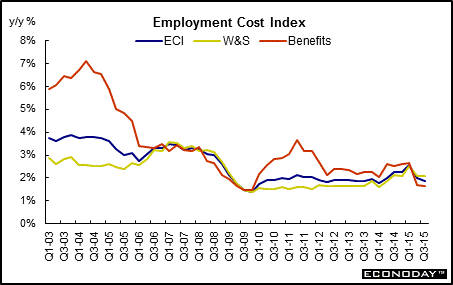
|
Long Term Perspective The employment cost index is the most comprehensive measure of compensation costs faced by employers. The wages & salaries component accounts for the bulk of the index with benefits accounting for about one-third of compensation costs. Fed officials monitor this indicator because they believe that accelerating pressures on compensation costs will eventually lead to increases for prices of consumer goods and services. Employment cost inflation was on a downtrend from 2004 through 2009 before picking up in 2010 and 2011 on a jump in benefit costs. But as benefit costs eased, the index then settled back to moderate gains.
Short Term Perspective The employment cost index increased only 2.0 percent year-on-year in the third quarter of 2015, unchanged from the pace of the prior quarter. But month-on-month, the index jumped 0.6 percent which followed, however, a 0.2 percent gain in the second quarter which was the lowest showing in the 33-year history of the report. Employment cost inflation in general is soft and not yet pulling up general prices. However, there is debate on whether employment costs are low due to non-hiring or reduced hours (trigger hours to obtain certain benefits) related to new health care requirements for full-time employees.
|
|||||||
| Legal Notices | ©Copyright 1998-2024 Econoday, Inc. |
powered by
![[Econoday]](images/logo.gif)
![[Apple App Store]](/images/AppleAppStore.png) ![[Econoday on Kindle]](/images/kindle.jpg) 
|
||||||
